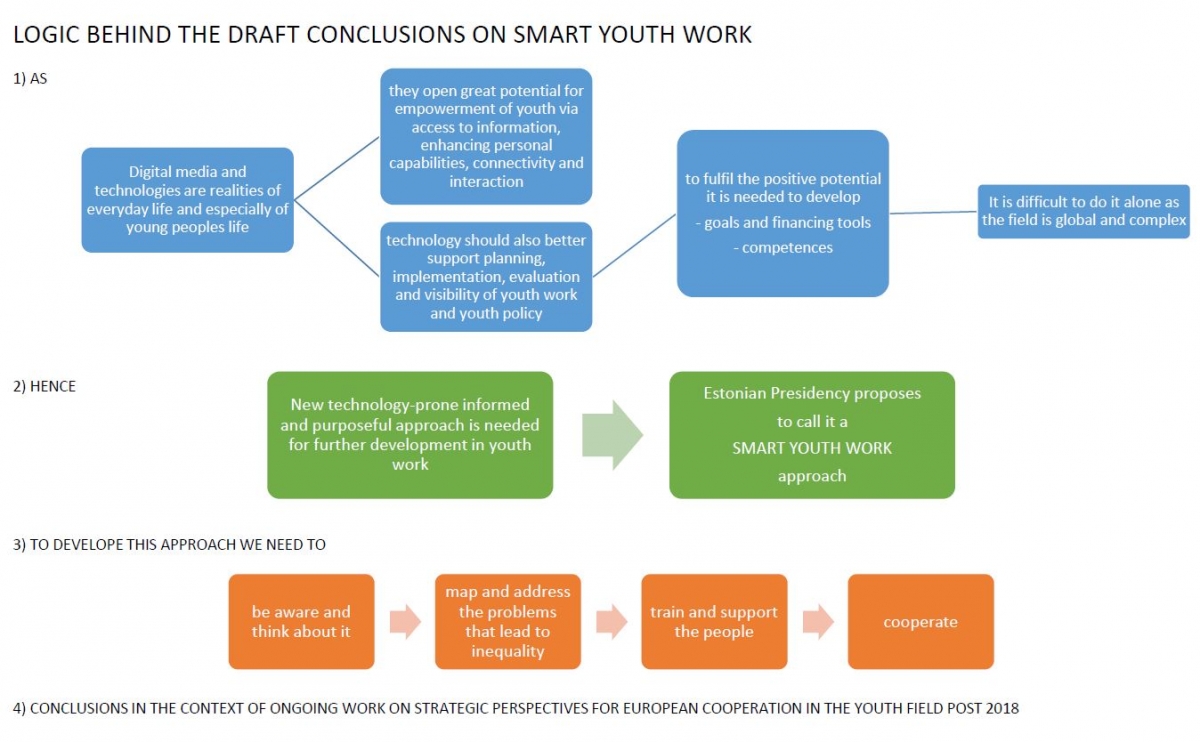Digital Youth
3.2.1. The political background and the rationale
Based on the list provided in Annex to the document, the political background for developing the Council conclusions on smart youth work could be described as based mainly on three pillars:
|
EU work on defining skills and competencies for living in the digital world and economy |
EU work on developing youth work that is relevant and of high quality |
Research and cooperation in Europe on youth issues and for better understanding the challenges of youth in the digital era |
The need to discuss and define common understanding about the smart youth work stems from a number of issues connected with digital changes in the society, the opportunities and challenges young people are facing and the need to develop relevant and high-quality youth work.
Digital changes in the society
- Digital media and technologies are increasingly part of everyday life and one of the supporting pillars for innovation and development in society. It is evident that young people are one of the catalyst for societal change, and this is due, inter alia, to their active embracing of digital media and technologies.
- The digital era brings along a complex set of different challenges and opportunities. It is a societal phenomenon that still needs discovery and development of appropriate responses. In order to support and bring added value to the activities in the field of youth work of the Member States from local to national level, the cooperation in the youth field in the European Union and in particular the exchange of best practices is important.
Opportunities and challenges young people are facing
- Technological developments open great potential for empowerment of youth by providing access to information and by enriching opportunities for enhancing one’s personal capabilities and competences; providing opportunities for connectivity and interaction with others but also for voicing one’s opinions, for creativity, for self-realisation of one’s rights and active citizenship.
- Better integration of technological developments when empowering youth is also important for the perspective of future job market and career perspectives of youth.
- Technological developments open great potential for empowerment of youth by providing access to information and by enriching opportunities for enhancing one’s personal capabilities and competences; providing opportunities for connectivity and interaction with others but also for voicing one’s opinions, for creativity, for self-realisation of one’s rights and active citizenship.
The need to develop relevant and high-quality youth work
- The development of technologies enables smart solutions, data-rich analyses and brings innovation to youth work methods and approaches, thus supporting the planning, implementation, evaluation, visibility and transparency of youth work and youth policy.
- Smart, informed and well-targeted actions are important to develop relevant competences and safe tools to prevent and manage the risks of digital era, like negative effects of excessive screen-time, internet addiction, cyberbullying, sexting, spread of fake news, propaganda, hate speech, online violence and violent radicalisation, threats to privacy, including unauthorised use and misuse of data and other forms of potential harm. Youth work and youth policies can play a crucial role in raising the awareness and competences of young people, especially those with fewer opportunities, their families, youth workers, youth leaders and other stakeholders supporting youth.
The rationale was also explained by the Estonian Presidency team in a working document in a more visual format:



